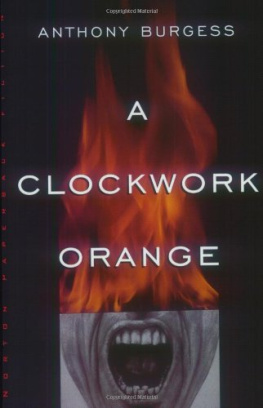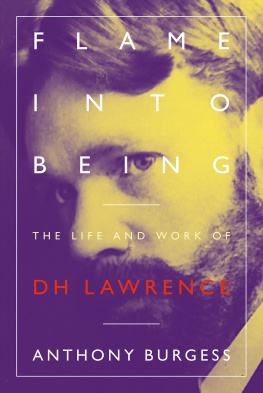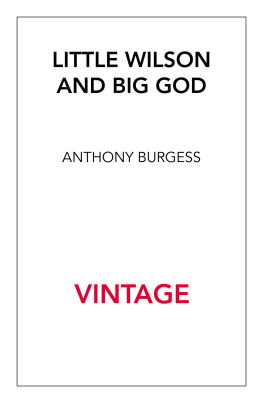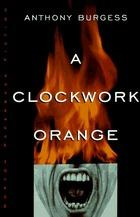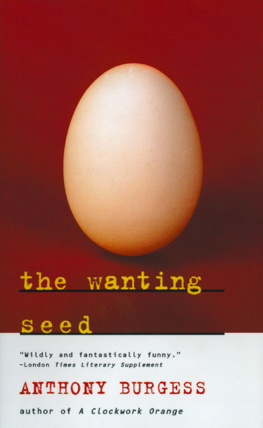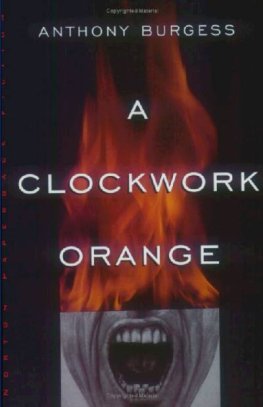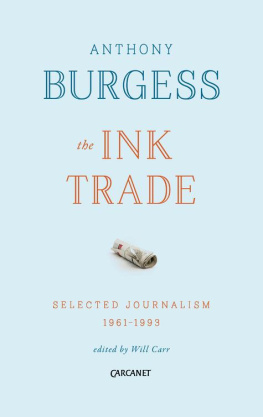Anthony Burgess - Tremor of Intent
Here you can read online Anthony Burgess - Tremor of Intent full text of the book (entire story) in english for free. Download pdf and epub, get meaning, cover and reviews about this ebook. genre: Prose. Description of the work, (preface) as well as reviews are available. Best literature library LitArk.com created for fans of good reading and offers a wide selection of genres:
Romance novel
Science fiction
Adventure
Detective
Science
History
Home and family
Prose
Art
Politics
Computer
Non-fiction
Religion
Business
Children
Humor
Choose a favorite category and find really read worthwhile books. Enjoy immersion in the world of imagination, feel the emotions of the characters or learn something new for yourself, make an fascinating discovery.

- Book:Tremor of Intent
- Author:
- Genre:
- Rating:5 / 5
- Favourites:Add to favourites
- Your mark:
- 100
- 1
- 2
- 3
- 4
- 5
Tremor of Intent: summary, description and annotation
We offer to read an annotation, description, summary or preface (depends on what the author of the book "Tremor of Intent" wrote himself). If you haven't found the necessary information about the book — write in the comments, we will try to find it.
Tremor of Intent — read online for free the complete book (whole text) full work
Below is the text of the book, divided by pages. System saving the place of the last page read, allows you to conveniently read the book "Tremor of Intent" online for free, without having to search again every time where you left off. Put a bookmark, and you can go to the page where you finished reading at any time.
Font size:
Interval:
Bookmark:

Anthony Burgess
Tremor of Intent
First published in 1966
To
J. McMichael M.B., Ch.B.
gratefully
But between the day and night
The choice is free to all, and night
Falls equally on black and white.
W.H. AUDEN
The worst that can be said of most of our malefactors, from statesmen to thieves, is that they are not men enough to be damned.
T.S. ELIOT
I
1
The position at the moment is as follows. I joined the gastronomic cruise at Venice, as planned, and the Poly-olbion is now throbbing south-east in glorious summer Adriatic weather. Everything at Pulj is in order. D. R. arrived there three days ago to take over, and it was good to have a large vinous night and talk about old adventures. I am well, fit, except for my two chronic diseases of gluttony and satyriasis which, anyway, continue to cancel each other out. There will be little opportunity for either to be indulged on this outward voyage (we shall be in the Black Sea the day after tomorrow), but I dribble at the glutinous thought of the mission-accomplished, unbuttoned-with-relief week that will come after the turn-around. Istanbul, Corfu, Villefranche, Ibiza, Southampton. And then free, finished. Me, anyway. But what about poor Roper?
D.R. handed over, as arranged, the ampoules of PSTX; I have, of course, my own syringe. I know the procedure. A sort of proleptic wraith of poor Roper is already lying on the other bunk of this Bibby cabin. I explained to the purser that my friend Mr Innes had been called by unforeseen business to Murfiater but that he would be making his way by road or rail or ferry or something to Yarylyuk and would be joining us there. That was all right, he said, so long as it was clearly understood that there could be no rebate in respect of his missed fifteen hundred miles of cruising (meaning gorging and fornication). Very well, then. For Roper all things are ready, including a new identity. John Innes, except in fertilisers. The bearded face of that rubbery man from Metfiz looks sadly back at me from the Innes passport. He has been many things in his time, has he not, that all-purposes lay-figure. He has been a pimp from Mdina, a syphilitic computer-brain skulking in Palaiokastritsa, a kind of small Greek Orthodox deacon, R. J. Geist who had the formula, even a distinguished Ukrainian man of letters set upon for his allegations of pederasty in the Praesidium. And now he is John Innes, who is a sort of egg-cosy for soft-boiled Roper. I well understand, sir, Her Majesty's Government's palpitating need to have Roper back. Questions in the House, especially after Tass passed through the jubilant news of the breakthrough in rocket-fuel research and Euro-vision showed the Beast gliding through May-day Moscow. What I cannot so well understand is the choice of myself as the agent of Roper's repatriation, unless, of course, it is the pure, the ultimate trust which, if I were not modest, I would say I have earned in my fifteen years of work for the Department. But you must surely be aware of a residue of sympathy for a schoolfellow, the fact that until his defection we maintained a sort of exterior friendship, though with many lacunae (war, peace, his marriage, my posting to Pulj); his last communication with the West was a picture post-card to myself, the message cryptic and, so I gather, still being pored over by the cipher-boys: Two minutes to four-up all their pipes martyrs' blood flows through them. Let us get certain things straight about Roper. Approach Number One will never work. I don't think for one moment that Roper can be persuaded to go back to anything. He has this scientist's thoroughness about disposing of the past. He never rummaged among old discarded answers. If he's a heretic at all it's your heresy he subscribes to the belief that life can be better and man nobler. It's not up to me, of course, to say what a load of bloody nonsense that is. It's not up to me to have a philosophy at all, since I'm nothing more than a superior technician.
I understand the reason, sir, for two approaches to Roper, persuasion first and force after. There's the propaganda value of freedom of choice, even though the horse's-mouth official letters in my jacket-lining neigh fantastic offers. And then, after a month or so, the judgement. Anyway, I confront Roper. I prepare to confront him by being not myself but Mr Sebastian Jagger (the rubber man wasn't needed, of course, for my fake passport). Jagger, typewriter expert; why didn't you christen me Qwert Yuiop? Jagger goes ashore and, in some restaurant lavatory, is swiftly transformed into something plausible and quacking, totally Slavonic. And then, if things go as they ought to go, a swift taxi journey to wherever Roper is at that hour of night, to be peeled off from the rest of the delegates of the scientific sbyezd. And then it will be I, very much the past, very much the old ways, not merely smelling of a West that has given him no answers but smelling of himself, an old formula discarded.
You think he can be persuaded? Or rather, do you think I can find it in my heart to be all that persuasive? How far am I (I am able to speak boldly now, this being my last assignment) convinced enough to want to convince? It's all been a bloody big game the genocidal formulae, the rocketry, the foolproof early warning devices mere counters in it. But nobody, sir, is going to kill anybody. This concept of a megadeath is as remotely unreal as specular stone or any other mediaeval nonsense. Some day anthropologists will comment in gently concealed wonder on the ludic element in our serious flirting with collective suicide. For my part, I've always played the game of being a good technician, superb at languages, agile, light-fingered, cool.
But otherwise I'm a void, a dark sack crammed with skills. I have a dream of life, but no one ideology will realise it for me better than any other. I mean a warm flat, a sufficiency of spirits, a record-player, the whole of The Ring on disc. I would be glad to be rid of my other appetites, since they represent disease, and disease, besides being expensive, robs one of self-sufficiency. A doctor I met in Mohammedia on that hashish-ring assignment persuaded me that a simple operation would take care of both, since they are somehow cognate. Ultimately I have a desire for a spacious loghouse on a vast Northern lake, conifers all about, all oxygen and chlorophyll, paddle-steamers honking through the mist. The bar on board the Mnnikk is stocked with drinks of intriguing nomenclature Juhan-nus, Huhtikuu, Edustaja, Kreikka, Silmpari and the captain, who has a large private income, is round-buyingly drunk but never offensive. They serve mouth-watering food-fish soused and salted, garnished with gherkins; slivers of hot spiced meat on toasted rye-and there are blonde pouting girls who twitch for savage anonymous love. Some day I will have that operation.
Look in my glands and not in the psychologist's report. I am mentally and morally sound. I tut-tut at St Augustine, with his 'O God make me pure but not yet'. Irresponsible, no appointment duly noted in the diary, the abrogation of free will. If you, sir, were really reading this, you would frown an instant, sniffing a connection between St Augustine (though of Canterbury, not Hippo, not less worthy but duller), Roper and myself. He was the patron saint of the Catholic college in Bradcaster where Roper and I were fellow-pupils. You have the name of the school in the files but you have not its smell, nor the smell of the city surrounding it. Bradcaster smelt of tanneries, breweries, dray-horses, canals, dirt in old crevices, brick-dust, the wood of tram-benches, hash, hot pies with gravy, cowheel stew, beer. It did not, sir, smell of Rupert Brooke's or your England. The school smelt of Catholicism, meaning the thick black cloth of clerical habits, stale incense, holy water, fasting breaths, stockfish, the tensions of celibacy. It was a day-school, but it had room for forty or so boarders. Roper and I were boarders, our homes being so far away, exiles from the South Kent I, Dorset he who had sat for scholarships and got them. The best Catholic schools are in the North, since the English Reformation, like blood from the feet when the arteries harden, could not push up so far so easily. And, of course, you have Catholic Liverpool, a kind of debased Dublin. There we were then, two Southern exiles among Old Catholics, transplanted Irish, the odd foreigner with a father in the consular service. We were Catholics, but we sounded Protestants with our long-aaaaa'd English; our tones were not those of pure-vowelled orthodoxy. And so Roper and I had to be friends. We had adjoining desks and beds. There was nothing homosexual about our relationship. I think we even found each other's flesh antipathetic, never wrestling as friends often do. I know I would cringe a little at Roper's whiteness, exposed for bed or the showers, fancying that a smell of decay came off it. As for heterosexuality, well, that was fornication, you see. The heterosexual act was a mortal sin outside the married state, that was made very clear. Except, we accepted, for such foreigners as had had Catholicism before we got it and hence had sort of founder members' special concessions.
Next pageFont size:
Interval:
Bookmark:
Similar books «Tremor of Intent»
Look at similar books to Tremor of Intent. We have selected literature similar in name and meaning in the hope of providing readers with more options to find new, interesting, not yet read works.
Discussion, reviews of the book Tremor of Intent and just readers' own opinions. Leave your comments, write what you think about the work, its meaning or the main characters. Specify what exactly you liked and what you didn't like, and why you think so.


